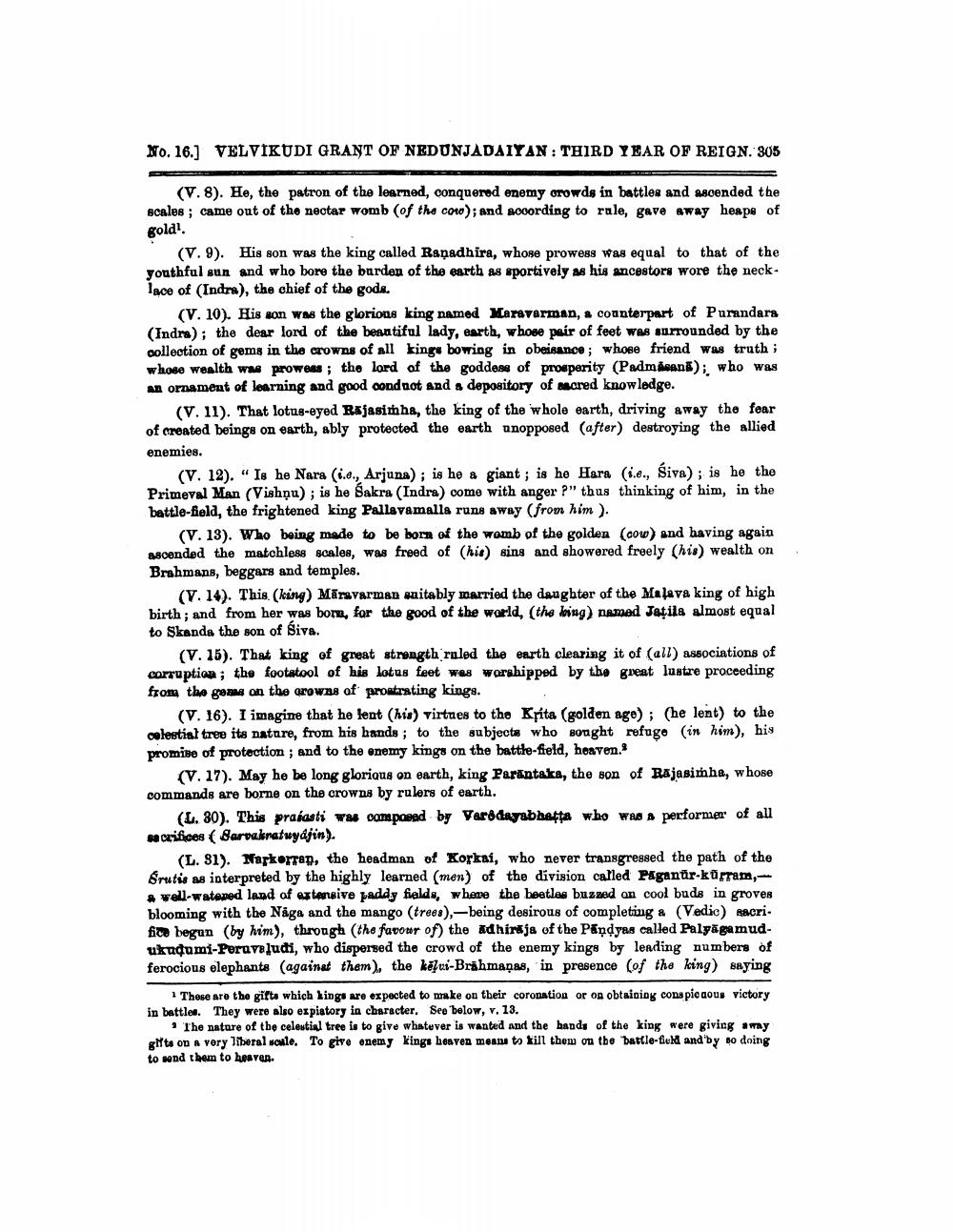________________
NO. 16.) VELVIKUDI GRANT OF NEDUNJADAIYAN : THIRD YEAR OF REIGN. 305
(V. 8). He, the patron of the learned, conquered enemy crowds in battles and ascended the scales ; came out of the nectar womb (of the cono); and according to rale, gave away heaps of
gold?
(V. 9). His son was the king called Ranadhira, whose prowess was equal to that of the youthful sun and who bore the burden of the earth as sportively as his ancestors wore the necklace of (Indra), the chief of the gods.
(V. 10). His son was the glorious king named Karavarman, « counterpart of Purandara (Indra); the dear lord of the beaatiful lady, earth, whose pair of feet WAS surrounded by the collection of gems in the crowns of all kinge bowing in obeisance; whose friend was truth; whose wealth was prowess; the lord of the goddess of prosperity (Padmana); who was an ornament of learning and good conduct and a depository of mored knowledge.
(V. 11). That lotus-eyed Rajasimha, the king of the whole earth, driving away the fear of created beings on earth, ably protected the earth anopposed (after) destroying the allied enemies.
(V. 12). "Is he Nara (i.o., Arjuna); is he & giant ; is he Hara (i.e., Siva); is he the Primeval Man (Vishņu); is he sakra (Indra) come with anger ?" thus thinking of him, in the battle-field, the frightened king Pallavamalla runs away (from him ).
(V. 13). Who being made to be born of the womb of the golden (cow) and having again ascended the matchless scales, was freed of (his) sins and showered freely (his) wealth on Brahmans, beggars and temples.
(V. 14). This (king) Märavarman unitably married the daughter of the Malava king of high birth; and from her was born, for the good of the world, (the ling) namad Jatila almost equal to Skanda the son of Siva.
(V. 15). That king of great strength ruled the earth clearing it of (all) associations of corruption; the footatool of his lotus feet was worshipped by the great lustre proceeding from the game on the growns of prostrating kings.
(V. 16). I imagine that he lent (his) virtues to the Kríta (golden age); (he lent) to the celestial tree its nature, from his hands; to the subjects who bought refuge (in him), his promise of protection; and to the enemy kings on the battle-field, heaven.
(V. 17). May he be long glorique on earth, king Parantaka, the son of Rajasimha, whose commands are borne on the crowns by rulers of earth.
(L. 30). This praiasti was composed by Yarodayabhafta who was a performer of all sacrifices (Sarvaknatwydjin).
(L. 81). Napkorran, the headman of Korkai, who never transgressed the path of the Srutis as interpreted by the highly learned (men) of the division called Pagantr-kurram, #well-watened land of extensive paddy fields, where the beetlas buzzed on cool buds in groves blooming with the Någa and the mango (trees),-being desirous of completing & (Vedic) sacri. fice begun (by him), through the favour of) the Adhiraja of the Pandya onlled Palyagamud ukadumi-Peruvsludi, who dispersed the crowd of the enemy kings by leading numbers of ferocious elephants (againat them), the këlus-Brāhmaṇas, in presence of the king) saying
These are the gifts which kings are expected to make on their coronation or on obtaining conspic aous victory in battles. They were also expiatory in character. See below, v. 13.
The nature of the celestial tree is to give whatever is wanted and the hands of the king were giving away gifts on a very liberal scule. To give enemy kings heaven means to fill them on the battle-field and by so doing to send them to heaven.




